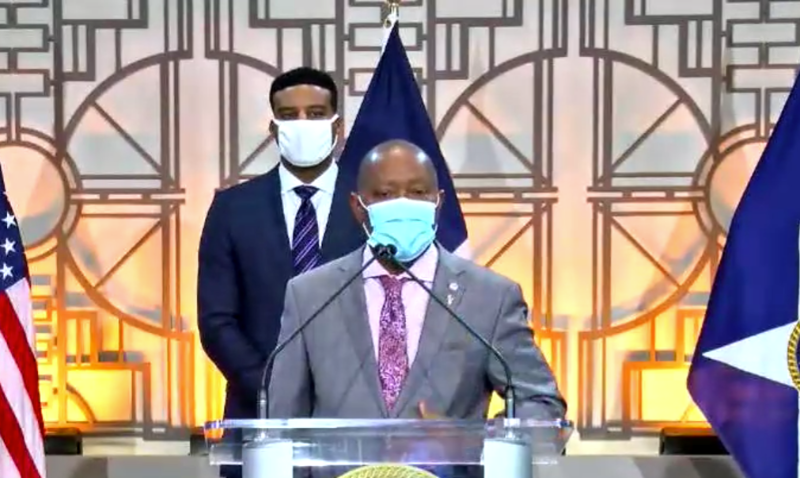Support Us
Houston's independent source of
local news and culture
account
- Welcome,
Insider - Login
- My Account
- My Newsletters
- Contribute
- Contact Us
Turner Details Newly Passed Rental Relief Program and Eviction Limitations

Screenshot
Houston Mayor Sylvester Turner revealed on Wednesday details about the City's new rental relief program, including new eviction limits from participating landlords.
[
{
"name": "Related Stories / Support Us Combo",
"component": "11591218",
"insertPoint": "4",
"requiredCountToDisplay": "4"
},{
"name": "Air - Billboard - Inline Content",
"component": "11591214",
"insertPoint": "2/3",
"requiredCountToDisplay": "7"
},{
"name": "R1 - Beta - Mobile Only",
"component": "12287027",
"insertPoint": "8",
"requiredCountToDisplay": "8"
},{
"name": "Air - MediumRectangle - Inline Content - Mobile Display Size 2",
"component": "11591215",
"insertPoint": "12",
"requiredCountToDisplay": "12"
},{
"name": "Air - MediumRectangle - Inline Content - Mobile Display Size 2",
"component": "11591215",
"insertPoint": "4th",
"startingPoint": "16",
"requiredCountToDisplay": "12"
}
,{
"name": "RevContent - In Article",
"component": "12527128",
"insertPoint": "3/5",
"requiredCountToDisplay": "5"
}
]
On Wednesday, Houston Mayor Sylvester Turner filled in some more details of the new rental relief program he
announced Friday, including the fact that landlords who accept funds from even one tenant who qualifies for assistance must agree to halt evictions for all residents at that apartment through September 2020.
Turner revealed during an afternoon press conference that the City’s second attempt at a rental relief program for Houstonians facing economic hardship due to COVID-19 was passed unanimously by the City Council earlier on Wednesday. The fund now sits at $20 million total, which includes the previously announced $19 million and a new donation of $1 million from local philanthropist Janice McNair. Turner said that the City and fund administration partner Baker Ripley are still happy to take more donations to the fund.
“We’ve done our best to leverage this $20 million, and we hope that number will grow,” Turner said.
As opposed to the first-come, first-served process for allocating the City’s last rental relief fund, Turner explained that this money will be given out based on a “vulnerability matrix” that prioritizes renters with the lowest rent payments first. Applicants can receive up to $2,112 from the relief fund if they live within Houston and are behind on rent payments from August or previous months. Landlords must first apply to receive funding, and then tenants at properties who have signed up can then apply for funding themselves.
In order to receive relief fund payments from qualifying tenants, Turner said that landlords must agree to halt new eviction proceedings, cancel any previously initiated evictions and promise to stop eviction proceedings for all residents of an apartment where even a single tenant qualifies for relief funds through the end of September. Participating landlords must also offer interest-free payment plans for any past due rent in excess of the $2,112 qualified applicants will receive, and have to waive late fees as well.
These strict eviction requirements for landlords represent an alternative to a city-mandated eviction moratorium, which Turner has refused to support despite the fact that the joint Houston and Harris County Housing Stability Task Force has recommended that the city issue such a moratorium now that state and federal eviction bans have expired.
“There is no perfect plan, and we know there are Houstonians with a lot of needs as a result of the pandemic,” Turner said. “That’s why I’m urging Congress to put more money for rent relief in the second CARES Act package, and I’m calling on our state leadership to address the needs of Texas cities.”
Turner said that the Houston Health Department reported 709 new cases of COVID-19 on Wednesday as well as an additional 14 deaths within the city. Houston’s cumulative case total has risen to 52,320 and the city has reported a total of 503 deaths from COVID-19. In Houston and the rest of Harris County combined, there have now been 80,914 confirmed cases of COVID-19 reported and 805 deaths since the start of the pandemic.
Dr. Persse of the Houston Health Department also gave a brief update during which he revealed that his hunch was right that a decline in the number of Houstonians getting tested for COVID-19 in recent weeks may have been tied to the positive news coming out of hospitals due to a slight downward trend in COVID-19 hospitalizations. Persse said that a health department analysis found that the biggest decreases in city testing volume tended to come within a couple of days after positive hospitalization numbers had been published.
“My fear is that people have misinterpreted a little bit of good news into thinking that it’s a lot of good news,” Persse said, before he asked Houstonians to continue getting tested if they have COVID-19 symptoms or even think there’s a chance they’re come into contact with someone carrying the disease.
“This is not the time to become lax,” Persse said.

